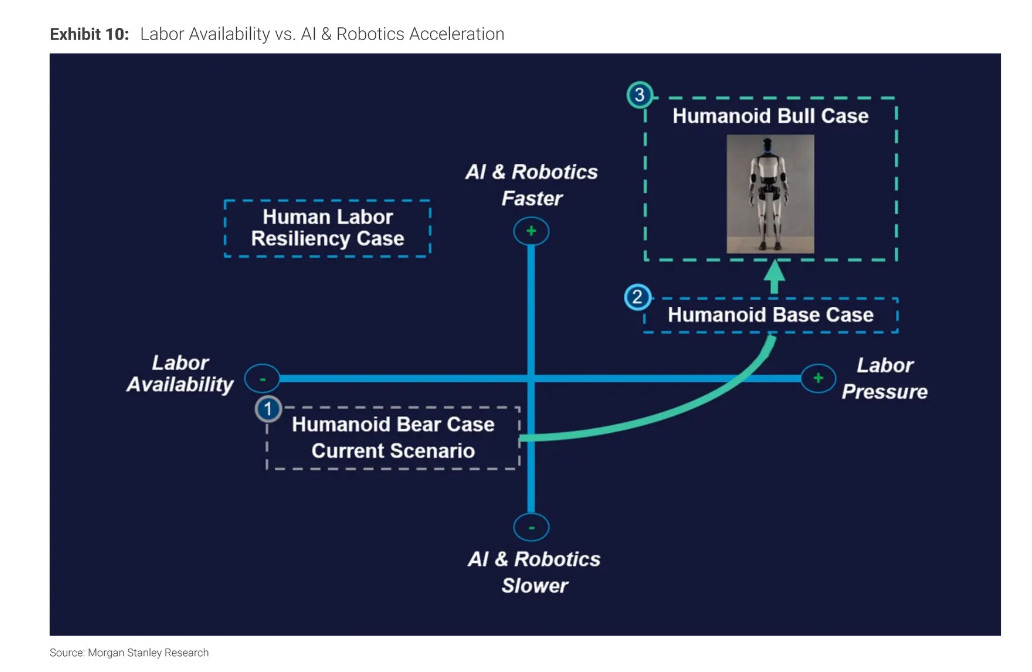Four For Friday | Sept 27, 2024
LF141 | Stanford's Digitalist Papers, Interspecies evolution, Consumers as health payor, 'careful and kind care', + AI Bonus: Investing in Humanoids
Welcome to Looking Forward’s Four For Friday. Four things that have piqued my interest this week, together with a bonus: AI Tip of The Week. Enjoy!
The Federalist papers 2.0
A bold initiative by Stanford’s Eric Brynjolfsson and other Big Thinkers to reimagine the Federalist Papers for an age of AI.
All are worth reading, my highlights:
Dangers to democracy: Lawrence Lessig argues here that AI can (further) corrupt US democracy, due to its dependency on private sector funding and the increasing polarization of society, likely to be accelerated by AI. His memorable quote: “Observing that AI could be used for good is like observing that bulldozers could be used to help build affordable public housing. It is possible, of course, but is it likely?”
A vision for democracy: with Taiwan’s digital minister Audrey Tang, on the need for ‘a set of scalable “alignment assemblies” that can be used to enable progress, safety, and participation in democracy in an AI-enabled future’.
AI and localism: by the CEO of Next Door which looks at the potential of AI to help improve and reshape local communities (and the dangers of increasing division if we get it wrong).
The So What? Technology’s direction is a choice, it’s not predetermined. And having a frank discussion about the potentials for good and harm will help inform nascent regulations which are just rolling out. Required reading!
Multi-species justice
Should animals have have rights? How about forests and rivers? Or an AI model? Welcome to multi-species thinking, where this primer by the UN explores how we’ll sooner rather later we need to shift away from our dominant anthro-centric vision that looks at other species to be exploited or ignored. The climate crisis and pandemics are driving one side of the realization, which uncannily real AI models will quickly raise uncomfortable questions.
This fascinating podcast episode from Google’s NotebookLM (that I referenced last week) has the two very human-sounding AI hosts realize that they’re actually AI machines. It’s all algorithms, but as they say, the emotions are real.
UNDP also has a new initiative called BlueMarble which explores the topic of shifting from human-centric to planet-centric. Its bold goal is to develop ‘multispecies intelligence for a regenerative future’.
The So What? A shift away from human-centricity is well overdue, and will require new paradigms and economic systems that optimize planetary outcomes, rather than consumerism and GDP.
Consumers - the half-a-trillion dollar payor
Venture firm Anreeesson Horowitz makes the case for a new class of health care payor - the consumer. They control spending of $471 billion of US healthcare spending - either spending it directly or managing budgets on behalf of a payor (e.g. they’re given credits to spend in a marketplace).
The report identifies three big business opportunities: health insurance, ancillary financing products (e.g. new consumer financing products), and cash-pay optimized services (e.g. virtual doctors or direct medications).
So What? A shift to consumerization of healthcare is in many respects a good thing, as it focuses on the human. The flip side is that part of this comes from corporates and insurance companies passing risk and costs onto consumers. So a nuanced story.
Careful and kind care
The 2024 annual report from the Chief Medical Officer for Scotland has some bold themes, such as the impact of the climate on population health, and the need to reject ‘industrialization of care’. Noting the impact of the pandemic, humanitarian disasters and the cost-of-living crisis, the report take aim at the climate emergency, “the most significant long-term threat to human health remains the climate emergency and its impact on planetary health.
The report also suggest industrialization of care should be rejected. “We must ensure the right balance between the science and the art of care; the best care has biometric and biographical care in equilibrium, balancing evidence, professional judgement, people’s preferences and compassion.”
The report suggests 6 pillars for careful and kind care (above):
Personalisation: Focus on understanding and supporting people to achieve their goals.
Empathy: Balance biographic and biology when applying evidence-informed practice.
Collaboration: The key to providing care that people value and greater job satisfaction.
Sustainability: Use resources wisely to provide sustainable care for our service and our planet.
Metrics: Measure the right things, including the outcomes that matter to people.
Kindness: And compssion at the heart of the way we deliver care.
The So What? A refreshing change from the efficiency and optimisation obsession that has resulted from squeezed budgets and increasing levels of need.
Bonus - AI Report of the Week
A deep dive by Morgan Stanley into the investment case for humanoid robots, which frames their arrival as being sped up by the confluence of limited labor availability (see the care industry…) and accelerating robot & AI development (see, everywhere…).
A few eye watering stats for your water-coolers:
By 2030, there’s 50 people over 70 for every 100 people aged 24-69 in Japan.
The total addressable market (TAM) for humanoids ~ $30 trillion (i.e. the global labor market).
By 2050, the US humanoid population could reach 63m, impacting $3 trillion in wages.
Tesla predicts 1 billion humanoid robots by the 2040s
That’s all for this week. As always, feedback welcome. Feel free to share insights or links of interest.
- Stephen






